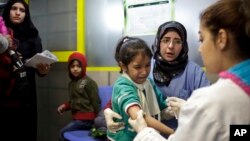The United Nations is calling for urgent action to save the lives of millions of women, adolescents and children from largely preventable causes by improving the quality of health care. The U.N. plans to unveil a new global strategy as part of its Sustainable Development Goals 2030 next week in New York.
The strategy focuses on the health of adolescents, aged 10 to 19. Officials say this is the time when healthy habits, such as exercise, good nutrition and no smoking are acquired and carried throughout adulthood.
This also is the period when boys, and especially girls, can be educated about reproductive health and family planning to prevent unwanted teen pregnancies and complications that can arise.
The strategy also involves an integrated approach. Flavia Bustreo, a senior official with the World Health Organization, or WHO, says health care does not operate in a vacuum, and that other sectors including the environment and education can make positive contributions.
“It is an approach by all governments, by all sectors in the government to apply their resources and their interventions in order to improve the health of women, children and adolescents,” Bustreo said.
Statistics on women’s health are bad, especially in poor countries, although data show poor people in rich countries also suffer inordinately from health problems. WHO reports 800 women die every day from pregnancy-related causes, mostly during labor. It says investment in quality health care would dramatically cut these preventable deaths.
WHO reproductive health chief Marleen Temmerman says women often die because they live in remote, rural areas and cannot get to a health facility. She says there usually are far more doctors and midwives in urban than rural areas. She tells VOA that Uganda, for example, is solving this problem by redistributing health care workers more equitably between the city and country.
“They have successfully distributed by giving some incentives to the health care workers to go to the remote areas, which has an impact on the quality of care within the facilities,” Temmerman said.
Officials figure it will cost $80 billion to implement the health improvement actions called for by the global strategy over the next 15 years.




